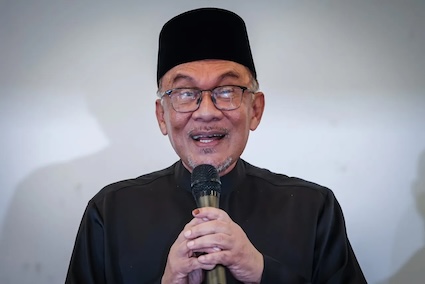Anwar’s Ketuanan Melayu

Not all Malays are equal
Murray Hunter
Ketuanan Melayu or Malay supremacy has been an unwritten component of government policy for the last 50 years. Many had hoped that Ketuanan Melayu would be pronounced ‘dead and buried’, when Anwar Ibrahim became prime minister.
Anwar’s cry over the years was Ketuanan Malaysian.
However, his launching of Malaysia Madani indicated otherwise. The semantics of Madani sounded good – sustainability, prosperity, innovation, respect, trust, and compassion – but the actions have resembled a continuance of Ketuanan Melayu, hidden behind the Madani branding.
With the reintroduction of the 1970s vintage 3Rs (Race, Royalty, and Religion), any effective discussion about Ketuanan Melayu has been suppressed. Mainstream portals are now reluctant to carry OpEds on the subject, and any blogger who does could be blocked by the MCMC.
Twelve months down the track, non-Malays are experiencing a sense of disenfranchisement they haven’t felt for years. This was symbolised by Anwar’s answer to a student who asked him about the quota system in education. The prime minister personally made her feel she had encroached upon taboo, citing the long forgotten ‘social contract’, another term from the seventies.
Enhancing Malay-centric government
Anwar has reaffirmed the 1.7 million people civil service doesn’t need any reform, even when it is bloated and inefficient. There are no moves to widen the ethnic diversity of the civil service inline with ethnic demographics that exist in Malaysia today.
RM 1.9 billion has been allocated to the Islamic Development Department of Malaysia (JAKIM) and its responsibilities widened to include responsibilities for policing censorship on the web, and playing a role in economic planning.
This has ensured a ‘Malay-centric’ mindset is further embedded into the civil service and government.
Apathy towards non-Malays
Over the year, one thing that is clearly visible is an apparent apathy towards non-Malays in the country. This has been clearly seen in the low representation of the Indian community in the cabinet, where the DAP is also under-represented according to the party’s numbers in parliament.
Anthony Loke’s caution over the Palestine Solidarity Week, and the Sarawak government stating Sarawak won’t be participating, indicate that major members of the unity coalition aren’t being consulted on major decisions.
While the non-Malays have been thrown to the sidelines, Malays themselves have been abused, when they get in the way of corporate cronies. The current Kampong Sungei Baru residents, and Kanthan farmer evictions are being undertaken just to enrich cronies and GLCs. The rights of the voiceless Malays must give way to corporations. Any sense of fairness and justice has been thrown to the wind.
When the New Economic Policy (NEP) originated back in 1971, the objective was to redistribute equity towards the Malays. It was not the mums and pops but corporate cronies that benefitted.
The optics are not good
Now the Madani objective is to transfer as much state land as possible to crony corporations and GLCs. This has been quasi-clandestine, where any critic or whistle-blower has been pursued through the civil law codes to silence them.
The directive to government ministries and departments not to entertain any correspondence not written in Bahasa Malaysia turns the administration even more towards a Malay-centric outlook.
The DNAA of deputy prime minister Ahmad Zahid Hamidi on charges of corruption, and prosecution of Muhyiddin Yassin gives the appearance of a judicial system that is being used to protect the Malay polity in power and persecute those in political opposition.
The introduction of the 40 Hadiths into the school curriculum gives the impression the education system is continuing to be Islamized by the government. Some of these decisions are cutting into government unity, as the Sarawak State Government is not adopting some of these directives.
Thus, after almost a year, its certain the Anwar administration has continued along the Ketuanan Melayu stance, abet in a more subdued manner, without the hard rhetoric. This has come at the cost of reform.
However, the beneficiaries are not the general Malay population, but an elite class within the Malay polity and their associates. This time, any criticisms of this unwritten policy is silenced in one way or another.

